Martin Edwards's Blog, page 13
February 4, 2025
The Life of Crime Newsletter
A quick post to say that I've just published my second free monthly newsletter on Substack. If you haven't already subscribed and would like to do so, you'll be welcome.
You can subscribe here: https://substack.com/@martinedwardsbooks
The newsletter doesn't replace this blog (and will not do so) but amplifies it in various ways and offers fresh opportunities for me to connect with readers, which has brought me a great deal of pleasure over the years. And, of course, I very much welcome constructive feedback.
February 3, 2025
The Castaways - Channel 5 TV review
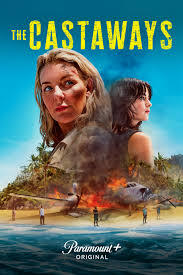
Sheridan Smith and Celine Buckens make unlikely sisters, I have to say. Fortunately, their acting ability is considerable and their tense relationship was well drawn, and well portrayed. The script was written by Ben Harris and based on a novel by Lucy Clarke, which I haven't read. In some ways, it's the ultimate airport thriller - a lively book involving odd goings-on connected with a flight - but the pace is pretty relentless, and that helps the viewers to suspend their disbelief.
So too does the structure. We switch back and forth between the present day, with Erin - six months after losing her sister - desperate to find out whether Lori is still alive, and the events before and after the plane crashed. Surprise, surprise, Lori survived - but the mystery surrounding the crash is cleverly maintained. Alas, the final plot twist was not a great idea, in my opinion, but it didn't really matter.
This is good, undemanding light entertainment. Yes, the story is implausible, but I was never bored, and that's a lot more than I can say for certain other TV serials. I've enjoyed Sheridan Smith's performances for years (she was a great Cilla Black!) but I was equally impressed by Celine Buckens, while of the supporting cast, Brendan Cowell is good as the dodgy pilot.
The Lesson - 2023 film review
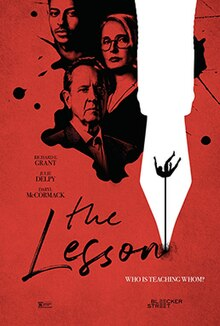
I started watching The Lesson when flying to the Nashville Bouchercon last year. Unfortunately, my screen went kaput half-way through the film, which was frustrating to say the least. Finally, I've caught up with the rest of the movie. Its immediate appeal is that it's about writing and writers, although in almost every such film I've ever seen, a key plot ingredient is plagiarism, and director Alice Troughton and writer Alex MacKeith fish in precisely the same waters. Yet even though it's not as unpredictable as it would like to be, this is an interesting movie.
The set-up is simple and the action of the film takes place in and around the country estate of a famed but reclusive writer called J.D. Sinclair (Richard E. Grant), who hasn't published anything for ages. He is married to a French artist, Helene (Julie Delpy). They have a son, Bertie, who is aiming to read English at Oxford. They hire Liam, a young Irishman with literary aspirations played by Daryl McCormack, as his tutor.
Part of me thinks, I must admit, that if someone who has had a highly expensive education and many advantages (although not, as it turns out, a pleasant home life) still needs a tutor to scape into Oxford, perhaps the place should go to someone with fewer advantages and greater ability. But one does have to feel sympathy for a boy who has grown up surrounded by a narcissistic father, cold mother, and enigmatic butler, especially when one learns that his brother drowned in the lake in the estate.
Richard E. Grant is an interesting actor and although sometimes he takes roles that don't really seem to suit his particular gifts, that isn't the case here. His compelling performance is central to The Lesson, elevating the film from the mediocre to the definitely watchable. There's a certain lack of tension in the script, and I don't think Liam's character is as well-developed as it should have been. But visually it's good to look at from start to finish, and I'm glad I did actually get to see the end of the film, even if I did have to wait a while to do so.
January 31, 2025
Forgotten Book - A Shroud for Grandmama

A Shroud for Grandmama is a forgotten book in more ways than one. I must have read it perhaps thirty years ago but when I looked at it again, I had no memory of it whatsoever. It was only when I saw a comment I'd made on John Norris's excellent (if slightly spoiler-y) review that I realised I had enjoyed the story once before. The great advantage, of course, of this failure of memory is that the second time around, I enjoyed the mystery all over again.
This is a truly eccentric book, with eccentric suspects, an almost endless succession of weird incidents, and an eccentric cop. Perhaps the oddities aren't so surprising when one realises that the author was John Franklin Bardin, who had previously published three impressive psychological suspense novels under his own name. It seems characteristically strange that he published this one, at different times, under two different pen-names - Gregory Tree and Douglas Ashe. I can't begin to explain why he did that. My own copy is a tatty paperback that is literally falling apart, and I've taken the above cover image of the Gollancz file copy of the UK edition from the Heartwood Books site, and I see that Gollancz cheekily hinted that Tree might be another name for Francis Iles! To add to the confusion, the book has also been published as The Longstreet Legacy.
This is a Gothic novel set in post-war New York City and featuring the Longstreets, a family that is only marginally less peculiar than the Addams family. The narrator - who is by no means entirely reliable - is Abigail Longstreet, a beautiful woman with a fondness for Jane Austen and the decorous manners of the past. When, prompted by a visit from a mysterious young man called Arthur Crump, she calls on her reclusive blind grandmother, Abigail is shocked to find Ella Longstreet dead, and wearing (of all things) nothing but a white bikini. On the floor of Ella's eerie mansion where her body is found are footprints in the dust - as if someone has been dancing. But how did she die? If it was murder, it seems like an impossible crime and this aspect of the story is highlighted on another great blog, Beneath the Stains of Time
From this vivid and rather disturbing opening, the plot thickens as an assortment of suspects, mostly members of the Longstreet family, are introduced. It's a very talky book, with only a limited amount of action, but Bardin was a skilled entertainer and good at keeping the reader anxious to turn the page. In many way, it's a classic whodunit with macabre trimmings. And a good one.
January 29, 2025
Mr Brooks - 2007 film review
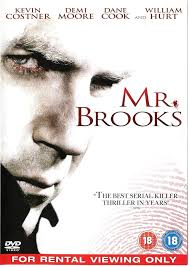
Mr Brooks is a film that I'd never come across until recently, although it had a great cast and was very commercially successful. When I finally caught up with it, I found myself watching a gripping thriller with a plot so crafty that I never could guess which way it was heading. Some critics felt there was too much plot, but I don't agree. After watching so many films and TV series which have outstayed their welcome because there wasn't enough imaginative storytelling to fill the time, this (admittedly rather dark, but occasionally funny) film made a very refreshing change.
The film begins with Earl Brooks (Kevin Costner) receiving an award as Portland's Man of the Year. He's a rich businessman with a happy marriage, a gorgeous wife and a pretty daughter who is away at college. But his wife (played by Marg Helgenberger) is worried about young Jane (Danielle Panabaker) and there are subtle hints that she is right to be worried.
She isn't, however, worried about Earl. Which is a mistake, because this amiable, under-stated guy is actually a serial killer, a man seriously addicted to committing murder. For a couple of years he's been a reformed character, but now his dark side is urging him to have fun again. In a brilliant piece of casting, Earl's id is played by William Hurt, who is at his best, menacing and playful at one and the same time. The back-and-forth between Costner and Hurt (which nobody else is privy to) is hugely entertaining: two gifted, but very different actors at the top of their form.
When Earl commits a double murder, the investigating officer (Demi Moore) is convinced that 'the Thumbprint Killer' is back in business. But the person who discovers Earl's secret first is actually a witness to the crime, a voyeuristic loser who calls himself Smith (Dane Cook) and possesses evidence that could destroy Earl. But when Smith tries his hand at blackmail, things take an unexpected turn...
And that's only the start. Unexpected developments come thick and fast. I like the deft way director and co-writer Bruce A. Evans handles the material. Apparently he originally conceived the story as a TV series and later contemplated a trilogy of films. But the single movie works extremely well. One of the best crime movies I've seen in ages.
January 28, 2025
Blink Twice - 2024 film review

The protagonist is Frida, a nail artist and cocktail waitress, who is played by Naomi Ackie, a British actor whose compelling performance is one of the film's major strengths. She is peculiarly interested from the outset in a tech zillionaire called Slater King (Channing Tatum), who is apologising on TV for his past unacceptable behaviour. He's spent a year hiding out on his own island and says he is a changed man.
Frida and her pal Jess (Alia Shawkat) meet King at a glitzy event and don't hesitate in accepting his invitation to join him and others on the island. There are enough sinister incidents to make even the most gullible person question what is going on, but it is only when Jess goes missing that Frida really becomes concerned. But will it be too late?
The soundtrack music is eclectic and contributes effectively to the movie. I felt the writing was a bit slack in places; the film could have benefited from a bit of cutting and sharper characterisation of some of the other people on the island. There's undeniably a preachy element to this film, but despite various reservations I remained interested until the final scene - which is very neat.
January 25, 2025
Forgotten Book - Chain of Darkness
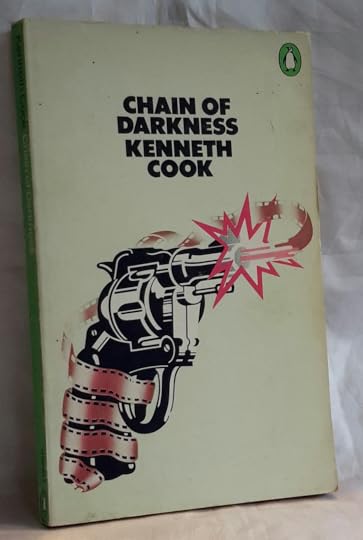
Having been greatly impressed by Kenneth Cook's most renowned novel, , when I spotted a green Penguin paperback of another book of his, Chain of Darkness, I snapped it up. I looked the book up and found relatively little discussion of it online, while the Goodreads reviews are pretty negative. But you do have to take some Goodreads reviews with more than a pinch of salt.
Suffice to say that I really enjoyed this book, which like Wake in Fright is a short and snappy read. It's also very well-written. Essentially it counterpoints the experiences of a career criminal called Johnson and a TV reporter, Ben Davidson. The brilliant opening sentence sets the tone of the book admirably: 'Johnson was confused and he probably didn't even mean particularly to hurt the policeman, but he killed him just the same.'
Johnson is a doomed protagonist, rather like someone James M. Cain might have created years earlier, while in his own way Davidson is, despite his journalistic talents, fated to have his career hemmed in by restrictions that he despises. We can anticipate roughly what is going to happen but I don't think that's problematic, because the story is told with pace and also with authority. That authority derives mainly from Cook's knowledge of the TV world, but also from a real life case which influenced his story.
There is one excellent online essay about the book, in which Geoffrey Luck describes the background to the creation of the story - although beware, it does contain spoilers. Luck explains why Cook published it in 1962, a year after Wake in Fright, even though he'd written it earlier. He also discusses the real life inspiration for the novel. Chain of Darkness shows that Cook was not by any means a one-trick pony and I'm interested in reading more of his novels.
January 22, 2025
The Gathering - 2003 film review
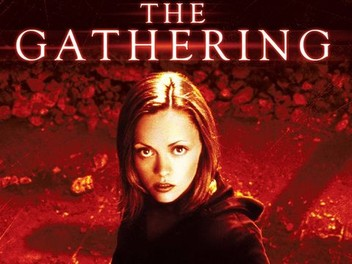
I'd never heard of the film The Gathering until I came across it on a streaming service. It's generally described as a horror movie, but when I noticed that the script was by the exceptionally prolific Anthony Horowitz, I was intrigued. Horowitz is a very talented storyteller with a gift for clarity (very important in storytelling, and by no means as common as one might imagine) and you can always be confident that he'll supply pace and plot twists.
I'm pretty sure that the film doesn't rank as one of his greatest successes, but it's certainly not a failure, either, because the central plot idea - which came to him, apparently, when he witnessed a car crash - is interesting and strong enough to keep the story moving along after a rather jerky start, in which two young people die at Glastonbury when a chasm opens in the ground to reveal a long-buried church.
Stephen Dillane plays Simon Kirkman, an expert who is called in by the church authorities to investigate. The hush-hush nature of the investigation suggests that the powers that be (headed by Robert Hardy, who is always good value) know more about the site than they care to admit. Meanwhile, Simon's wife Marion is driving a car when she is distracted by her young son Michael. She hits a young American woman called Cassie (played by Christina Ricci) but thankfully Cassie is barely hurt. She is, however, suffering from amnesia. She goes to live with the Kirkmans in their very posh house and becomes attached to Michael. But then spooky things start to happen in the local village...
As the story begins to take shape, there are a number of unexpected developments, including another car accident. I wasn't exactly biting my nails, and I did think that there was a certain diffusion of interest that reduced the tension. For instance, Marion becomes peripheral to the story, so what happens to her has less impact that it might have done. All the same, it's one of those horror films that manages to avoid the silliness that is often the fate of this genre. Perhaps it's not as horrific as it should have been, but it's good entertainment.
Secrets from the Agatha Christie Archives by Jared Cade
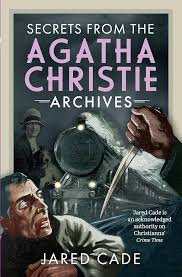
This new book from Pen & Sword offers a great deal of bibliographic information relating to the writings of Agatha Christie. It's clearly the product of extensive research on the part of the author. Jared Cade, whom I first met at a CWA Daggers lunch many years ago, has previously written a book about Christie's famous disappearance in 1926 and he has also published detective novels.
Secrets from the Agatha Christie Archives is an enticing title, although it has to be said that anyone seeking lurid revelations will be disappointed. Instead, they will find a lot of detail, including word counts for the novels (which reinforce the point that Christie wrote very short novels by the standards of today). There is information about American editions, including (for instance) a concise summary of the differences between the British and American endings of Three Act Tragedy, a novel with a central concept whose brilliance is, I think, generally under-rated. The motive for the crimes, however, isn't very satisfactory, hence the discrepancy between the two versions of the story.
In his introduction, Jared Cade refers to a J'Accuse, a TV programme presented by the late Michael Dibdin back in 1992, which amounted to a sustained attack on Christie's merits as a writer. Julian Symons, for one, felt very unhappy that he had been persuaded to take part and his views edited in a way that was disobliging to Christie, whom he admired both personally and professionally (and Christie reciprocated that admiration, by the way). Cade is, in my view, rightly critical of the programme. Dibdin was a good writer, but his involvement in the programme did him no credit. To say this is not to suggest that Christie is beyond criticism; obviously she isn't. But any criticism needs to be objective and founded on sound arguments, and - on the whole - that wasn't the case with J'Accuse.
Overall, this is a useful reference. There's no shortage of books about Christie these days - one day I might be tempted to add to the pile! - but there's enough material in this book to be of value to future researchers, in particular those puzzled by the complex publishing histories of some of Christie's novels, stories, and other works.
January 20, 2025
The Lansdowne Literary Festival

I'm just back from a long weekend in London, where I took part in the Lansdowne Club's Literary Festival. A year ago I was delighted to take part in the Club's first festival, a one-day event which was such a success that Veronica Hollander and her team decided not only to have another festival this year, but to turn it into a weekend event - and to invite me back again. And a great deal of fun it was.
The Club is a splendid venue and it was an added pleasure to spend the weekend in the company of Andrew Taylor, who has for many years been one of my favourite writers, and his wife Caroline. There was a delightful dinner on Friday evening, while on Saturday morning Andrew and I were involved in recording, of all things, a featurette for a forthcoming Hammer movie blue-ray release of a crime film that has long been unavailable. More about this at a future date, but it was an extremely interesting experience. To be a 'bonus extra' is a first for both of us!
On Saturday afternoon, Andrew and I were in conversation together. Over the years, we've worked together on many occasions and the hour flew by. Later events included an interview with Frank Skinner, followed by dinner in the company of some of the festival attendees (the photo above gives an idea of the splendour of the setting). Sunday morning saw Andrew and I conducting a three-hour crime writing workshop with some very promising writers, while lunch was preceded by Rory Ross, the journalist, interviewing his nonagenarian mother Gill Johnson about her memoir Love from Venice.
All in all, it was a delightful festival, and I enjoyed chatting with so many interesting people. Unfortunately, as I got home, I received the sad news that a very old friend of mine, who has been very ill lately, had died. She was a crime fiction fan who reconnected with me thanks to this blog after we'd lost touch for many years, and she has gone far too soon. At a future date, I'll write more about her, but for now, I keep in mind that she, like me, was a believer in making the most of every day, and that's what I hope to do.



